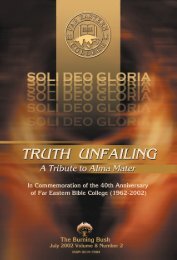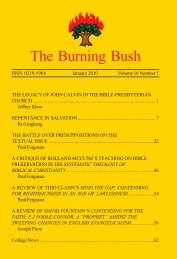Baptismal Regeneration Examined.indd - Far Eastern Bible College
Baptismal Regeneration Examined.indd - Far Eastern Bible College
Baptismal Regeneration Examined.indd - Far Eastern Bible College
Create successful ePaper yourself
Turn your PDF publications into a flip-book with our unique Google optimized e-Paper software.
The doctrine of baptismal regeneration teaches<br />
that baptism is essential for salvation. Those who<br />
teach this doctrine say that faith in Christ is not<br />
enough, one must go through the rite of water<br />
baptism if one is to receive salvation. Thus, their<br />
salvation formula is: Faith plus baptism equals<br />
salvation.<br />
The question we want to ask ourselves is:<br />
“Does the <strong>Bible</strong> teach this?” This tract seeks to<br />
answer this question. Is baptismal regeneration<br />
tenable on the basis of principles of <strong>Bible</strong><br />
interpretation, theology and context?<br />
Principles of <strong>Bible</strong> Interpretation<br />
Fallacious doctrines stem from equally<br />
fallacious interpretation. The <strong>Bible</strong> means what<br />
it says and says what it means. It is, therefore,<br />
imperative that we rightly divide the Word of<br />
truth (2 Tim 2:15). If we do not interpret Scripture<br />
accurately, we may fall into the danger of adding<br />
to or subtracting from God’s Word.<br />
The sixty-six books of the <strong>Bible</strong>, both the Old<br />
Testament as well as the New Testament, are<br />
the inspired, infallible, inerrant and authoritative<br />
Word of God. The Old Testament and the<br />
New Testament are an organic unity. They are<br />
inseparable. They belong together. They are<br />
intrinsically connected. This fact is succinctly<br />
expressed by these two couplets: “The Old<br />
2
is by the New explained, the New is in the<br />
Old contained,” and “The New is in the Old<br />
concealed, the Old is by the New revealed.” Jesus<br />
Himself regarded the Old Testament as the Word<br />
of God (Matt 5:17-18). He explained the things<br />
concerning Himself to the Emmaus disciples from<br />
the Old Testament (Lk 24:27). It is, therefore,<br />
crucial to realize that if any doctrine is to be<br />
formulated, it must find basis not only in the New<br />
Testament but also in the Old. Sadly, those who<br />
teach baptismal regeneration fail to apply this.<br />
Most of the arguments offered are taken from so<br />
called “proof texts” from the Gospels and Acts.<br />
Some of these verses are Mark 16:16, Acts 2:38<br />
and Acts 22:16. These verses seem to support the<br />
idea that water baptism is essential for salvation.<br />
However, in biblical interpretation, formulation<br />
of any doctrine must find basis not just in the<br />
Gospels and Acts, which are historical books but<br />
also in the Epistles, which are essentially doctrinal<br />
in nature, and in the Old Testament.<br />
The Gospels and Acts, being historical in<br />
nature, primarily record for us what Jesus and the<br />
Apostles did and taught. Declarative statements<br />
are usually given without explanation or<br />
exposition. The Epistles are the books which deal<br />
with doctrine. The Epistles articulate what Jesus<br />
declared, and explain the significance of the Old<br />
Testament concerning Christ. Those who teach<br />
3
aptismal regeneration have failed to recognize<br />
the need to reconcile their doctrine with the<br />
Epistles, particularly Romans and Galatians. In the<br />
process of presenting their doctrine of baptismal<br />
regeneration, they have interpreted the verses out<br />
of context.<br />
Another important principle in biblical<br />
interpretation is that Scripture must not be made to<br />
clash with Scripture. The <strong>Bible</strong> does not contradict<br />
itself. In Romans, Paul in no uncertain terms<br />
emphasized the fact that salvation is by grace<br />
through faith. “For therein is the righteousness of<br />
God revealed from faith to faith: as it is written,<br />
The just shall live by faith” (Rom 1:17). If we<br />
say that water baptism is essential for salvation,<br />
why then did not Paul mention baptism as a<br />
requirement? Paul should have said, “The just shall<br />
live by faith and through baptism.” But nowhere in<br />
the entire book of Romans did Paul elevate the rite<br />
of water baptism to the level of the faith we must<br />
have in Christ in order to be saved. In Ephesians<br />
2:8-9, Paul makes it very clear, “For by grace are<br />
ye saved through faith; and that not of yourselves:<br />
it is the gift of God — Not of works, lest any man<br />
should boast.”<br />
Then, how about James 2:20 which states that<br />
“faith without works is dead”? The proponents<br />
of baptismal regeneration say that “works” here<br />
include water baptism. Now, it is vital to interpret<br />
4
the <strong>Bible</strong> in its proper context. A knowledge of<br />
the historical context would play an important<br />
role in helping us to interpret the Epistle of James.<br />
The historical context can be seen in chapter 1:26<br />
- 2:13 and 4:1-11. James was addressing a people<br />
who called themselves Christian but showed no<br />
repentance in their lives. The argument that water<br />
baptism is essential for salvation cannot be argued<br />
from here because baptism is not even mentioned<br />
in James. We, therefore, cannot equate “works”<br />
with “baptism”. If we do, we will make James say<br />
what he did not say.<br />
The doctrine of baptismal regeneration<br />
is an attack on the very heart of the<br />
gospel and the work of Christ.<br />
It is equally important to note the authorial<br />
intent of James. James was rebuking sin. He was<br />
not giving a discourse on the importance of<br />
baptism for salvation. What James was trying to<br />
drive at was that if a person says he has faith, his<br />
life must manifest the marks of grace. True faith<br />
will result in a changed life shown by good works<br />
but good works are not the means whereby a man<br />
obtains salvation.<br />
The proponents of baptismal regeneration have<br />
started on a wrong premise for interpreting the<br />
<strong>Bible</strong>. They have failed to allow Scripture to speak<br />
for itself. Rather, they have read into Scripture and<br />
5
thereby teach a doctrine which is contrary to the<br />
historic Christian faith.<br />
Theological Grounds<br />
The doctrine of baptismal regeneration is an<br />
attack on the very heart of the gospel and the<br />
work of Christ. To say that baptism is essential for<br />
salvation is equivalent to saying that Christ’s death<br />
on the cross was not sufficient to save sinners<br />
because anyone who wants to be saved must,<br />
on his part, go through the waters of baptism.<br />
Paul calls this “another gospel” (Gal 1:8-9). Paul<br />
warned, “But though we, or an angel from heaven,<br />
preach any other gospel unto you than that which<br />
we have preached unto you, let him be accursed.”<br />
It is, therefore, of utmost importance that we<br />
understand the doctrine of salvation.<br />
In Galatians, Paul warned the Christians against<br />
a group of false teachers called Judaizers who<br />
taught that in order to be saved, one must not only<br />
believe in Christ, one must also be circumcized.<br />
Paul called these people “false brethren”.<br />
In Romans, Paul contended with the Judaizers<br />
very fiercely. Paul argued very strongly that<br />
salvation is not by works but solely by grace<br />
through faith. In chapter 4, Paul answered<br />
the question, “Was Abraham justified by faith<br />
or works?” Paul pointed out that “Abraham<br />
believed God, and it was counted unto him for<br />
6
ighteousness” (Rom 4:3; Gal 3:6). Paul further<br />
argued that salvation did not come because<br />
Abraham was circumcized. Abraham was saved<br />
“Not in circumcision, but in uncircumcision. And<br />
he received the sign of circumcision, a seal of the<br />
righteousness of the faith which he had yet being<br />
uncircumcised: that he might be the father of all<br />
them that believe, though they be not circumcised,<br />
that righteousness might be imputed unto them<br />
also; and the father of circumcision to them<br />
who are not of the circumcision only, but who<br />
also walk in the steps of that faith of our father<br />
Abraham, which he had being yet uncircumcised”<br />
(Rom 4:10-12). Abraham was, thus, saved before<br />
circumcision! It is important to know that the New<br />
Testament sacrament of water baptism is identified<br />
with the Old Testament rite of circumcision (Col<br />
2:11-12). Abraham was justified by faith alone. It<br />
is the same for New Testament believers — “sola<br />
fide”. Faith is the only requirement for salvation.<br />
What then is water baptism all about?<br />
According to the Westminster Shorter Catechism<br />
question ninety-four: “What is Baptism?” The<br />
answer is “Baptism is a Sacrament, wherein the<br />
washing with water, in the name of the Father,<br />
and of the Son, and of the Holy Ghost doth<br />
signify and seal our engrafting into Christ, and<br />
partaking of the benefits of the covenant of grace,<br />
and our engagement to be the Lord’s.” Baptism<br />
7
cannot save. It is a sign and a seal (Gen 17:11; cf<br />
Rom 4:11). They signify and visibly represent the<br />
things that should have already taken place in the<br />
heart, namely, faith, conversion, forgiveness of<br />
sin, communion with Christ, etc. The sacrament<br />
of water baptism is a means of grace. It serves to<br />
help sinful people understand in pictorial form the<br />
spiritual truths concerning salvation. Baptism is,<br />
thus, “an outward sign of an inward grace.” That<br />
is why Paul said, “But he is a Jew, which is one<br />
inwardly; and circumcision is that of the heart, in<br />
the spirit, and not in the letter” (Rom 2:29; Deut<br />
10:16). Paul saw baptism as an expression of<br />
faith in Christ. To the Corinthians, he said, “Christ<br />
sent me not to baptize, but to preach the gospel”<br />
(1 Cor 1:17). If the gospel and baptism are both<br />
essential for salvation, then Paul should have said,<br />
“Christ sent me both to preach and to baptize.” It<br />
is important to see the sacrament of water baptism<br />
in the correct theological perspective.<br />
Spurgeon said, “If my garment of<br />
salvation requires only a stitch from me,<br />
I am lost!” <strong>Baptismal</strong> regeneration<br />
is such a stitch.<br />
The doctrine of baptismal regeneration<br />
apparently suggests that a person has the ability to<br />
decide whether he wants to be saved or not. An<br />
explanation concerning the doctrine of man and<br />
of sin is needed here.<br />
8
Man has no ability whatsoever to save<br />
himself from sin. After the Fall, man became<br />
totally depraved. The heart of man is completely<br />
corrupted by sin (Jer 17:9). Man is dead in sin<br />
(Eph 2:1). Man is not able to respond to spiritual<br />
things (1 Cor 2:13-14). Given the choice, man will<br />
choose to reject Christ rather than believe in Him.<br />
“As it is written, there is none righteous, no, not<br />
one; there is none that understandeth, there is<br />
none that seeketh after God” (Rom 3:10-11). How<br />
then can man be saved? It is only by the grace of<br />
God. God, before the foundation of the world,<br />
chose some to be saved (Eph 1:3-11). He made<br />
salvation possible by sending His only begotten<br />
Son, Jesus Christ, to die for sinners (Jn 3:16; Rom<br />
5:8). Knowing that we cannot and will not come<br />
to Him by ourselves, He draws us to Himself (Jn<br />
6:37, 44). Even the very faith to believe was given<br />
to us by God. And having saved us, He continues<br />
saving us to the very end (Rom 8:28-39). This is a<br />
wonderful truth. It not only comforts our hearts,<br />
it also gives all the glory to God. Salvation is by<br />
grace from beginning to end and not by works.<br />
Charles H. Spurgeon, “the prince of preachers,”<br />
said, “If my garment of salvation requires only a<br />
stitch from me, I am lost!” <strong>Baptismal</strong> regeneration<br />
is such a stitch.<br />
9
Contextual Grounds<br />
In order that the arguments for baptismal<br />
regeneration be valid, they must of necessity find<br />
consistency in the <strong>Bible</strong> where every person saved<br />
were saved after they were baptized. However,<br />
this is not the case. Baptism is not mentioned in<br />
Acts 4:4; 9:35; 11:21; 13:12, 48; 14:1; 17:4, 12, 34 when<br />
the people, after hearing the gospel, believed and<br />
were saved. Although, it is not stated that they<br />
were baptized, we are not saying that no baptism<br />
occurred. The point Luke was trying to drive at<br />
was that salvation came by way of faith alone<br />
— they “believed”.<br />
Consider the example of Cornelius in Acts<br />
10:44-48. Peter was directed of the Lord to preach<br />
the gospel to Cornelius, a centurion. Acts 10:44<br />
tells us that “While Peter yet spake these words,<br />
the Holy Ghost fell on all them who heard the<br />
word.” Note that the Holy Spirit indwelt Cornelius<br />
and his household before baptism (Acts 10:47-<br />
48). Rom 8:9 says, “Now if any man have not the<br />
Spirit of Christ, he is none of his.” Are those who<br />
teach that water baptism is essential for salvation<br />
saying that Cornelius was not saved before he<br />
was baptized? The fact that Cornelius received<br />
salvation before baptism is confirmed by Peter’s<br />
report to the Jerusalem Council in Acts 11:15-17.<br />
Peter reported that Cornelius received the baptism<br />
of the Holy Spirit just as the Apostles had received<br />
10
theirs at Pentecost. This was the basis on which<br />
Peter concluded that salvation was also given to<br />
the Gentiles. Therefore, the baptism of the Holy<br />
Spirit, and not water baptism, causes regeneration.<br />
<strong>Regeneration</strong> is associated with<br />
Holy Spirit baptism, not water baptism.<br />
The physical act of water baptism<br />
does not and cannot save.<br />
Consider Acts 19:1-6. In this incident, we find a<br />
group of John’s disciples. They were baptized with<br />
water by John but did that baptism save them?<br />
The answer is obviously in the negative. Paul had<br />
to instruct them concerning the way to salvation<br />
which is in Christ alone. That is why Paul had to<br />
ask this searching question: “Have ye received the<br />
Holy Ghost since ye believed?” This verse and the<br />
subsequent verses tell us that Paul’s concern was<br />
not whether they had already been baptized with<br />
water but whether they had received the baptism<br />
of the Holy Spirit. <strong>Regeneration</strong> is associated<br />
with Holy Spirit baptism, not water baptism. The<br />
physical act of water baptism does not and cannot<br />
save.<br />
In the process of arguing against the doctrine<br />
of baptismal regeneration, we are not saying that<br />
the ordinance of water baptism is not important.<br />
Indeed, baptism is commanded of the Lord.<br />
However, it must be stated categorically that<br />
11
aptism is necessary unto obedience but not<br />
necessary unto salvation.<br />
Dear reader, do you belong to a church<br />
which teaches that water baptism is necessary for<br />
salvation? Please understand that the Lord Jesus<br />
Christ and the Apostles did not teach this. The<br />
Apostle Paul made it very clear: “The just shall<br />
live by faith” (Rom 1:17). “For by grace are ye<br />
saved through faith; and that not of yourselves: it<br />
is the gift of God — Not of works, lest any man<br />
should boast” (Eph 2:8-9). If you do belong to<br />
such a church, the <strong>Bible</strong> commands separation<br />
and withdrawal from false churches (2 Cor 6:14-<br />
18; 1 Tim 6:3-5; 2 Tim 2:16-21; Eph 5:11). Do you<br />
love the Lord? Jesus said, “If a man love me, he<br />
will keep my words: and my Father will love him,<br />
and we will come unto him, and make our abode<br />
with him” (Jn 14:23).<br />
Dr Jeffrey Khoo is the academic dean of the<br />
<strong>Far</strong> <strong>Eastern</strong> <strong>Bible</strong> <strong>College</strong> and serves as an<br />
elder of True Life B-P Church.<br />
<strong>Far</strong> <strong>Eastern</strong> <strong>Bible</strong> <strong>College</strong><br />
9A Gilstead Road, Singapore 309063<br />
True Life <strong>Bible</strong>-Presbyterian Church<br />
P. O. Box 141, Newton Post Office, Singapore 912205.<br />
Sunday Service at RELC Auditorium, 10:30 am<br />
30 Orange Grove Road. Tel: 6254-1287<br />
E-mail: febc@pacific.net.sg Website: www.febc.edu.sg

















